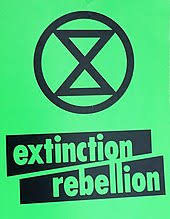Written by Doug McConnell
Everywhere we look environmentalists are being exposed as hypocrites. But is this relevant to the arguments these environmentalists are making and, if not, how can we improve the quality of public debate on environmental issues?
In August, Prince Harry and Meghan Markle used 4 private jet flights  over 11 days while campaigning on climate change.[i] Apparently the return trip to Nice created seven times more carbon emissions per person than any one of the 20 commercial flights that fly that route each day. That prompted Muna Suleiman, a climate campaigner at Friends of the Earth, to say: “People should really think hard about the message they’re sending out… There are ways to travel more responsibly.”
over 11 days while campaigning on climate change.[i] Apparently the return trip to Nice created seven times more carbon emissions per person than any one of the 20 commercial flights that fly that route each day. That prompted Muna Suleiman, a climate campaigner at Friends of the Earth, to say: “People should really think hard about the message they’re sending out… There are ways to travel more responsibly.”
Then, in October, a number of celebrities who protested with Extinction Rebellion, including Benedict Cumberbatch, Steve Coogan, and Daisy Lowe were called out for contributing to the climate emergency. Cumberbatch advertises MG cars in India and previously promoted Jaguar motors in adverts with the tag line: “It’s good to be bad.”[ii] Coogan has owned a succession of gas-guzzling cars including Ferraris, Mazdas, Range Rovers and Porsches (and he has a history of speeding offences!).[iii] Lowe also has a penchant for fast cars and travelling in private jets which she glorifies on social media.
Perhaps we shouldn’t be surprised about this celebrity hypocrisy given that celebrities have plenty of money to spend and, as George Monbiot recently highlighted, wealth is the strongest determinant of high carbon output.[iv] But what about the rank and file Extinction Rebellion members? Surely they wouldn’t exhibit such depths of hypocrisy. Cue Extinction Rebellion protesters buying food from McDonalds, a company that symbolises the global capitalist system devouring the planet. Tory MP for Mansfield Ben Bradley, reacted to this by tweeting, “The lack of self-awareness is absolutely staggering”.[v] 
Piers Morgan suspects that even the XR co-founder, Skeena Rathor, is a hypocrite because she (probably) owns a television. She wouldn’t answer the question but, according to Morgan, ‘The truth is you do have a television and you don’t want to admit to having a television because that immediately throws you into the hypocrisy debate because you’re guzzling up and burning the atmosphere with your TV, and you don’t want to admit it because it makes you look like a rank hypocrite.’[vi] To top it all off, even the vegan activist, Mr Broccoli, took a taxi rather than public transport to his interview with Good Morning Britain and drives a Mercedes-Benz Sprinter thousands of miles setting up glamping pods at festivals.[vii] The shame!
But what, exactly, is the significance of all this hypocrisy? Does it undermine these environmentalists’ claim that we must do more to protect the environment? In a word, no. The reasons for which were articulated by the Extinction Rebellion supporting celebrities in the following letter responding to these accusations:
“Dear journalists who have called us hypocrites. You’re right. We live high carbon lives and the industries that we are part of have huge carbon footprints. Like you, and everyone else, we are stuck in this fossil-fuel economy and without systemic change, our lifestyles will keep on causing climate and ecological harm. There is, however, a more urgent story that our profiles and platforms can draw attention to. Life on earth is dying. We are living in the midst of the 6th mass extinction. …We invite all people with platforms and profiles to join us and move beyond fear, to use your voices fearlessly to amplify the real story…”
In other words, we are all hypocrites, unless, of course, you agree with global environmental destruction, in which case, you’re immoral. Better to be a hypocrite. They also claim, correctly, that their hypocrisy is beside the point; to focus on that is an ad hominem attack which deflects attention from the real ethical arguments for greater environmental protection.
However, it isn’t obvious that this line of response has been very effective at convincing people to join their cause. Brexit Party leader Nigel Farage had this to say about the celebrity letter: “The more they say, the more ridiculous they look. It really irks ordinary folk.” Tory MP Nigel Evans said: “It sticks in our throat to have mega-wealthy superstars with their private jets and gas-guzzling cars lecturing hard-working people,” while fellow Tory, Pauline Latham, said: “It’s a bit like telling someone to stop smoking while you keep puffing away… Either you believe in the cause and set an example or you don’t.”[viii]
 None of these responses actually deal with the argument in the letter. They simply restate the original concern with hypocrisy and try to highlight that these celebrity environmentalists are different from the general public. These right-wing politicians remain fixated on the features of the people asking for action on environmental issues rather than the environmental issues themselves. How come? Well, there is a more charitable answer and less charitable one.
None of these responses actually deal with the argument in the letter. They simply restate the original concern with hypocrisy and try to highlight that these celebrity environmentalists are different from the general public. These right-wing politicians remain fixated on the features of the people asking for action on environmental issues rather than the environmental issues themselves. How come? Well, there is a more charitable answer and less charitable one.
More charitably, I think we can all agree that it is annoying to be lectured to by people we perceive to be sanctimonious. It generates even more indignation when a hypocrite lectures you without even seeming to care that he or she is a hypocrite. We naturally look to knock them down from their high horses and show them to be no better than you or me. In other words, the accusations of hypocrisy are defensive, tit-for-tat responses to what are perceived as personal attacks. This comes out clearly when Piers Morgan says of the Extinction Rebellion members, “They’re making it personal to us, they’re saying we’re gas-guzzling horrible people and there they are nipping off to McDonald’s. Shameless hypocrites.”[ix] When these environmentalists threaten Piers’ identity as a non-horrible person he looks to bring them down a peg or two.
This personal conflict is exacerbated by the fact that taking climate change to be a serious risk has become associated with a left-wing political identity and is less compatible with right-wing political identities. When one’s political identity is threatened, one is encouraged to defend that identity by reaffirming one’s group membership and trumpeting its value. Farage and Evans’; reactions seem to exemplify that as they implicitly claim to be ‘ordinary’ and ‘hard working’ folk while excluding the environmentalists as neither of these.
I think we can understand the desire to point out the hypocrisy of environmentalists in this way. We all enjoy deflating sanctimonious opponents and reinforcing our membership of groups that we value. However, the point remains that these ‘wins’ don’t say anything to undermine arguments in favour of greater action on environmental issues. If we took hypocrisy to disqualify people’s arguments, then we would only accept arguments in favour of protecting the environment if they were delivered by environmental saints. But even if we could find such people, I suspect many would find them even more insufferable for the very reason that they couldn’t be faulted. In any case, environmental saints are open to a different ad hominem attack. Given the wide array of things that one has to opt out of to remain carbon neutral, it is an unreasonable challenge for most of us given the jobs that are available, the places we can afford to live, the places we can afford to shop, and so on. So environmental saints are easily painted as abnormal, members of some out-group, and we have a ready excuse for why we cannot live up to their unreasonable standards.
The less charitable interpretation of Farage, Morgan, Evans, and Latham is that they are acting as, “conflict entrepreneurs”, i.e. deliberately trying to polarise the public because they hope to personally benefit politically and/or financially. People that act in this way are deliberately refusing to engage in reasoned argument and so damage the quality of public debate. Furthermore, by generating conflict between people, they undermine the potential for the public to cooperate in solving shared problems.
Practically, what can we do if people refuse to take environmentalists seriously and continue to ignore their arguments? In her recent Uehiro Lectures, Elizabeth Anderson argued for a range of measures.[x] In addition to excluding conflict entrepreneurs from public decision-making, we should promote face-to-face discussion of political issues by diverse stakeholders in contexts that avoid antagonistic framings that threaten people’s identities. We should encourage people to speak from personal experience to generate empathetic responses rather abstract moral principles and science which are less motivating. This should help us identify shared concerns that require shared solutions.
The demand to build cooperation and solutions on personal experience is challenging when it comes to environmental responses because much of the concern is not based on personal experience but on scientific modelling of the future and comparisons with the state of the environment 50+ years ago. Furthermore, slowly shifting baselines over generations have allowed the environment to get steadily worse without people recognising.[xi] Nevertheless, we can find personal experiences of reduced water and air quality,[xii] loss of fish, insects, birds and other animals, Pacific Islander’s having their homes washed away by the sea,[xiii] and Alaskan communities threatened by loss of sea ice.[xiv] If Anderson is right, we need a way of bringing people with these personal experiences of environmental degradation into face-to-face meetings with the people who are making environmental policy.
As it happens, Anderson’s suggestions fit very neatly with one of Extinction Rebellion’s key demands,  that a citizens’ assembly for climate and ecological justice be formed to make decisions on how to respond to the climate emergency. “Assembly members will hear balanced information from experts and those most affected by the [climate] emergency. Members will speak openly and honestly in small groups with the aid of professional facilitators.”[xv]
that a citizens’ assembly for climate and ecological justice be formed to make decisions on how to respond to the climate emergency. “Assembly members will hear balanced information from experts and those most affected by the [climate] emergency. Members will speak openly and honestly in small groups with the aid of professional facilitators.”[xv]
Of course, getting governments to implement such assemblies remains a significant challenge and, as activists continue to campaign for better policy, we can expect the public debate to be dogged by ad hominem attacks and tribalism. Until we establish a more socially inclusive means of developing environmental policy, we can each do our small part by ignoring the conflict entrepreneurs and trying not to indulge in ad hominem attacks that will further polarise us.
[i] https://metro.co.uk/2019/08/19/harry-meghan-use-private-jet-fourth-gas-guzzling-flight-just-11-days-10596687/
[ii] https://www.thesun.co.uk/news/10149538/extinction-rebellion-celebs-admit-hypocrites-flying-globe-while-preaching-climate-change/
[iii] https://www.thesun.co.uk/news/10164799/steve-coogan-joins-extinction-rebellion-activists-london/
[iv] https://www.theguardian.com/commentisfree/2019/sep/19/life-earth-wealth-megarich-spending-power-environmental-damage
[v] https://www.newstatesman.com/politics/energy/2019/10/can-you-be-extinction-rebellion-and-eat-mcdonald-s
[vi] https://metro.co.uk/2019/10/09/piers-morgan-explodes-extinction-rebellion-co-founder-heated-debate-can-stop-talking-10886423/
[vii] https://www.dailymail.co.uk/news/article-7593295/Mr-Broccoli-drives-gas-guzzler-Vegan-activist-white-van-man.html
[viii] https://www.thesun.co.uk/news/10152183/extinction-rebellion-luvvies-open-letter-hypocrites/
[ix] https://metro.co.uk/2019/10/08/piers-morgan-ruthlessly-mocks-greta-thunberg-slams-extinction-rebellion-protestors-spotted-mcdonalds-10879937/
[x] https://blog.practicalethics.ox.ac.uk/2019/10/prof-elizabeth-andersons-uehiro-lectures-lecture-2-summary-improving-political-discourse-1-re-learning-how-to-talk-about-facts-across-group-identities/#more-14136
[xi] https://www.theguardian.com/commentisfree/2017/dec/20/selective-blindness-lethal-natural-world-open-eyes-environment-ecosystem
[xii] https://www.theguardian.com/environment/2019/oct/22/mexico-colorado-river-people-left-without-river
[xiii] https://www.nationalgeographic.com/environment/2018/11/rising-seas-force-marshall-islands-relocate-elevate-artificial-islands/
[xiv] https://www.theguardian.com/environment/2016/dec/19/alaska-sea-ice-vanishing-climate-change-indigenous-people

I have been waiting with baited breath to see if there will be any response to any or all of the last 3 “environmentally” related posts on this website, but seeing none, I will offer a response of my own.
My thanks to Doug McConnell for pointing out that attacks on environmentalists for “hypocrisy” are ad hominem attacks that shift the focus away from the real issues while doing nothing to refute them. But thanks, also, for drawing attention to the “shifting baselines” syndrome first recognized by fisheries biologist Daniel Pauly (Trends in Ecology and Evolution 10 (10): 430; The Ocean’s Shifting Baseline, TED Talk April 2010), as noted by George Monbiot in your references, who explains, “The people of each generation perceive the state of the ecosystems they encountered in their childhood as normal and natural. When wildlife is depleted, we might notice the loss, but we are unaware that the baseline by which we judge the decline is in fact a state of extreme depletion.” Thus we don’t realize that British waters were once, as he says, “thronged with great whales, vast shoals of bluefin tuna, two-metre cod and halibut the size of doors” just a few centuries ago, nor do we understand ourselves—us humans, generation after generation of us—as the active agents in their demise. Moreover, as our baselines regarding the state of reality have shifted, so has our collective attention narrowed its focus, until it no longer takes in the reality beyond the play of our humanly constructed world of images and symbols. That’s how the drastic defaunation of our planet has crept up on us while we weren’t looking. That’s how, on a recent estimate, the total biomass of all wild land mammals taken together was revealed as having dwindled down to less than 2% of the biomass of all humans plus our livestock (Bar-On, Phillips and Milo 2018, PNAS 115 (25):6506-6511). But never mind that nine of the ten “most charismatic animals” identified in one study are now listed as vulnerable to extinction—we will have “virtual populations” of them to frolic with us on into the future (Courchamp et al. 2018, PLOS Biology 16 (4): e2003997).
To those who adhere to a “total utilitarian” view of the optimal human population size, perhaps this will be considered quite a marvelous achievement. But I find there is something deeply shameful in our species’ own self-absorption, to have propagated ourselves and our wasteful cultures so profligately as to have brought about such an impoverishment of food webs around the globe, and all the while to have allowed ourselves to pursue this path of destruction in a state of seemingly blissful innocence. To echo Tory MP Ben Bradley, “The lack of self-awareness is absolutely staggering.”
From a perspective that “pushes back the baseline” to take in the toll in nonhuman lives over recent decades and centuries as well as its accelerating tempo today, the fixation on the identity politics of race and gender (and other forms of human subgrouping) within “liberal” circles is embarrassingly self-indulgent in its anthropocentrism. However, it is the tendency to take for granted that “the economy” is the thing that supports human lives, an assumption that seems to be made across the entire political spectrum, that poses the “existential risk” that we face today. Moreover, coupling this assumption with some of the well-meaning “sustainable development goals” that aim to promote human benefits through a slew of proposed mega-projects will spell disaster for all of us in the longer term. The members of Extinction Rebellion are quite right when they say that “Life on Earth is dying,” and that “without systemic change, our lifestyles will keep on causing climate and ecological harm.” What we need to do is NOT build more dams, roads, wind farms, or bioenergy plants to support one last great hurrah of “economic growth.” What we need to do, as a species, is “scale down and pull back,” in the words of Eileen Crist (Abundant Earth: Toward an Ecological Civilization, University of Chicago Press 2019), so that the thing that REALLY supports human (and all other) lives—the Biosphere—can begin to heal.
Thanks for your thoughts Ronnie. I, too, have been thinking about our obsession with growth, especially our inability to seriously attend to it as a problem let alone consider that we might have to give it up. The prospects of decoupling exponential global growth from pollution/resource use seem extremely poor, yet on we go.
Thanks for the post. It reflects though a difficulty I had with Anderson’s lectures.
It seems to me that some of the Extinction Rebellion examples above could also be characterised as conflict entrepreneurship. Clearly it is impossible to live without ANY carbon footprint and the TV example is ludicrous. However, if you look at the more egregious of the celebrity examples, it does seem that making money from selling particularly high carbon cars (especially when one already earns enough to give one freedom to be squeamish about taking up jobs that are against one’s deeply held values) is something that someone with a genuine concern for the environment would not do. One the other hand, in a career where public image is a key part of future success, suddenly “using one’s platform to amplify”these issues could be interpreted as a form of climate entrepreneurship itself- it is not implausible to believe that just as they sold gas guzzling cars for their own benefit, they are now positioning themselves on the ‘good side’ because they foresee personal branding benefit. And they benefit precisely because they pit themselves against people like Farage and Morgan who are pretty generally disliked. And while they use arguments, the arguments don’t really make sense in context: the complaints are not about the film industry being carbon intensive, or how many TVs they personally own (in the celebrity cases), but the fact that they have just recently been using the very same platform and voice trying to persuade people to do more of what they now say should be the target of civil disobedience.
In Anderson’s lectures she sought to maintain a neutral viewpoint, and I found it hard to distinguish the bad behaviours in debate from the bad side of the debate. That is, that it is not clear if bad behaviours like climate entrepreneurship matter if they are on the right side (except if they happen to be a bad PR move). After all, even if they are doing it to help their box office returns and get in on the next Tesla ads, and even if the reasoning is a little off, if it ends up by saving the planet that seems like a good thing.
Thanks Sarah. I agree that there seems to be an important moral difference between driving cars and taking money to promote cars. Now, perhaps Cumberbatch won’t do that anymore in light of the role the car manufacturers have been playing to lobby against environmental action. But say that he did; it doesn’t, then, seem like he can claim that the system makes it impossible for him not to appear in car ads the way the average person can’t avoid driving a car to work and so on. Cumberbatch, presumably, has enough money so that he can easily avoid promoting cars for more money.
Similarly, I’m more sympathetic to the royals using private jets because of the security they (apparently) need compared to the average celebrity who could surely fly in first class on normal commercial flights rather than take private jets. The system hardly traps you into taking private jets just because you are rich and can afford them.
But one might adjust the argument and say, I know I’m not trapped into using private jets but they are very tempting when you can easily afford them and they make your life so much easier. This is analogous to the average person who still eats red meat despite knowing the environmental costs. This makes Daisy Lowe appear to be saying – please take away the private jet temptations because if theyre available I can’t resist using them. It seems that individuals just aren’t that good at acting morally and so we don’t just need to adjust markets/structures/systems to prevent people being trapped into environmentally poor options we also need to limit the availability of non-essential but tempting environmentally poor options.
I hope that you will consider what I have to say here, even though it is not on the same conversational level as the previous comments. I’m aiming for a more philosophical level–we NEED to address these uncomfortable issues, even if it tweaks certain social norms. Sorry.
If Extinction Rebellion protesters are, as shown, “buying food from McDonalds, a company that symbolises the global capitalist system devouring the planet,” it is surely a sad commentary on the present state of affairs; but I’m not sure it reflects an ethical lapse—“something that someone with a genuine concern for the environment would not do”—so much as a grotesque failure on the epistemic front, an inability to connect the dots that join the global industrial food system with the devastation of the Amazon and tropical forests around the world (livestock production is “the single largest driver of habitat loss,” according to Machovina, Feeley and Ripple 2015 (Biodiversity Conservation: The Key Is Reducing Meat Consumption, Science of the Total Environment 536: 419-431) and connect that with the billions of people now becoming “affluent” enough to eat like Americans and join our ranks in the global obesity epidemic. Clearly few people at present understand how bizarrely out of sync the standard industrial diet is from what would be appropriate for a large-bodied primate closely related to the rest of the predominantly vegetarian great ape clade.
But a few things stand out in my mind after reading the other two recent “environmental” posts, Jonathan Pugh’s take on Prof. Anderson’s second Uehiro lecture and Stefan Schubert’s post on the psychology of existential risk. Frankly, I find it extremely sad that so many human beings today seem to find their “identity” not in their ability to think for themselves and forge a life through independent choices but rather in a “political” or “cultural” identity that needs to be fiercely defended even as it consists more and more of simply partaking of the cognitive and emotional resonance within a particular subgrouping of our species. Perhaps this would be OK if the group resonance included a serious understanding of where we are today and an emotional response to it that motivated intelligent collective action, but so far the opposite seems to be the case. Where are the contemporary existentialists drawing attention to and thinking deeply about the very real problems of “existence” that confront us today? Might we have a neoSartrean who would reiterate the fact that, as we choose ourselves, we are choosing what “the human being” will be—and point out that, as things stand today, that’s not a very pretty sight.
Moreover, Schubert’s examination of laypeople’s views about the badness of extinction, finding that their thoughts about the long-term future and the possible extinction of the human species are “relatively unstable,” and his conclusion that this is at least partly “because most people haven’t thought a lot about [these issues] previously,” is also sobering. We just don’t seem to get it: we humans (and our associated domesticated species) have transformed ecosystems around the world into “biotic pyramids” (see Aldo Leopold, or any good ecology text) that are dangerously top-heavy, and this is NOT going to be ecologically sustainable, although due to the complexity of the systems involved, there’s no way to predict how or when the whole socioecological system will come crashing down.(Now here comes the obligatory “unless we change our ways,” but so far the evidence for such a change is sorely lacking, and the time for making a difference is growing ever shorter.) Strangely, even conservation biologists tend to shy away from describing the way we humans have departed from an appropriate ecological niche for our species, perhaps in unconscious adherence to the academic cultural norm of refraining from falling into “essentialism” when it comes to us humans–a move that not only rejects a serious acceptance of biology and evolutionary continuity, but simultaneously delegitimizes any further discussion of the effects of continuing human population growth, since, like true Cartesians, we are forbidden to engage in seeing ourselves as “animals.” But would anyone seriously argue, ontologically, that we are not? Perhaps in an armchair, but not likely in the physician’s office—every now and then even philosophers need to come back to the reality on the ground. And even with all of our wonderful medical technology, fantasies of “life extension,” cryopreservation and seeding the universe with our wonderful genes go poof if we go on to collapse the Biosphere, which we presently seem to be working very hard to accomplish. Does anyone see a neoKierkegaardian clown emerging from the wings to warn the audience, “The theatre is on fire”?
Comments are closed.